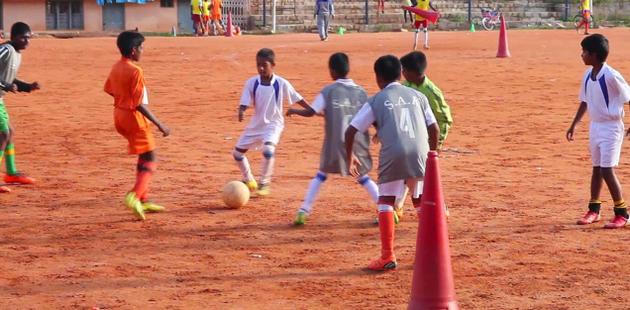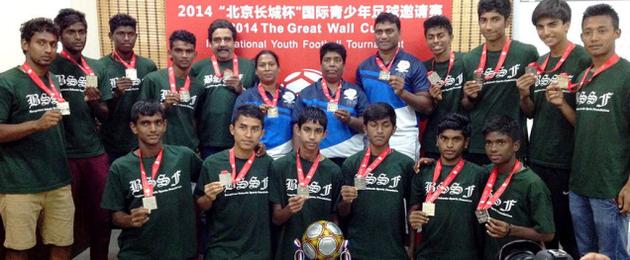A Kannada documentary traces the journey of underprivileged footballers from Bengaluru to China. The film, which won a national award, went largely unnoticed
A team of 14 boys from the shanties of Austin Town, who love football over anything else in their lives, recently created history by representing Bengaluru at the Great Wall Cup at the Olympic Nest in Beijing.
These underprivileged kids participated in an event where 30 countries competed for the trophy and returned with the runners-up cup. Their parents work as sweepers, maids, band members who play at funerals, and cooks in smalls hotels.
Moved by the spirit of these boys, Jacob Varghese, who has earlier directed Kannada hits like Savari, and Prithvi starring Puneeth Rajkumar, made Dribbling with their Future, a Kannada documentary on these children.
The film got the award in the Best Exploration/Adventure film category at the 63rd National Film Awards this year, but was lost in the cacophony of larger films.
According to Jacob, Dribbling with their Future documents the journey of the children to realise their dream of playing at the Great Wall Cup. Jacob believes his film should speak, rather than its creator.
“It is up to the audience to interpret and relate to it,” he says. So far he has made two short films –Andhyam (the story of a hangman), which went to many international film festivals, and Putti (the story of a seven year old girl, and her grandmother in a drought-hit village).
Excerpts from the interview:
What made you want to move away from star-driven features to a documentary like this?
I was never in awe of any actor and I always treat them as a part of the crew. For me, they are mere actors and never stars or heroes.
There are a lot of people I come across in my life, doing extraordinary work, which makes them real heroes, unlike our reel heroes. And these people go unnoticed. Documentary filmmaking helps me bring their story into the limelight. That is really exciting.
What made you make a film on this particular subject?
The determination of the boys, who are all younger than 15, and participated in the football tournament crossing all hurdles, touched me to the core. The boys in Austin Town love to play football, at a time when boys of their age opt for cricket, which is more remunerative than football. I wanted to attempt making a documentary as there are so many compelling stories you see around, which need to be told. That’s why, when I heard of these boys, who come from underprivileged backgrounds, and learnt of their passion for this sport and the struggle they underwent to fulfil their dream, I decided to document their journey from Austin Town to Beijing.
Did you enjoy making this documentary?
I loved this aspect of filmmaking as a documentary filmmaker — the independence, no boundaries and framework for the shoot — I was comfortable with this genre. This allows me to explore newer avenues of filmmaking.
Had you expected an award for this film?
No, not at all. If I get an award, it is well and good. At the same time an award doesn’t make any difference to the approach I have towards life and filmmaking.
Why do you think your film went unrecognised?
Yes, there was confusion regarding the language of the film. The film has a voiceover in English and this led to all the confusion. I again wanted to make it clear that Dribbling with their Future is a Kannada documentary, as some people even now think that it was not a Kannada film. I didn’t want to publicise the award — it came my way. I made a film and the jury recognised that.
source: http://www.thehindu.com / The Hindu / Home> Features> MetroPlus / Muralidhara Khajane / Bangalore – April 11th, 2016

